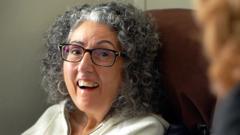Sarah Ezekiel, at the age of 34, was a mother of two when she received a devastating diagnosis of motor neurone disease (MND). This progressive neurological condition gradually eroded her physical capabilities, ultimately taking away her ability to speak. The loss of her natural voice was a profound and isolating experience, severing a fundamental connection to her identity and her loved ones. For years, her communication relied on technology that produced generic, synthetic speech, a stark contrast to the unique tones and inflections that defined her.
The profound impact of losing one’s voice extends beyond mere communication; it affects personal expression, emotional connection, and the ability to interact authentically with the world. Sarah faced this daily challenge, navigating life with a voice that was not truly her own, diminishing the richness of her interactions.
However, a groundbreaking technological advancement offered a beacon of hope. Through dedicated efforts, a mere eight seconds of pre-existing, albeit scratchy, audio of Sarah’s natural voice were retrieved. This minuscule snippet, containing the unique characteristics of her speech, became the foundation for an innovative voice synthesis project. Specialists leveraged this brief recording, analyzing its phonetic properties and vocal nuances, to create a personalized, digital rendition of her voice.
The successful implementation of this technology meant that Sarah could once again communicate using a voice that closely resembled her own. The return of her authentic vocal identity brought immense emotional relief and practical benefits, allowing her to express herself with greater nuance and comfort. This technological leap not only restored a vital aspect of her personal identity but also significantly enhanced her quality of life and her connection with her family and friends, transforming daily interactions from functional exchanges to genuine conversations imbued with her unique essence.



